TODAY’S READING IN THE ONE YEAR BIBLE- PART 2- WHY BALAAM WAS A FALSE PROPHET EVEN THOUGH HIS FOUR PROPHECIES WERE TRUE; THE NEW TESTAMENT CHRISTMAS STORY.
In yesterday’s reading we saw how Balaam was a savvy religious professional. He had gained a wide reputation among the people of the Middle East and did not want to disappoint his customers, whether they worshiped Chemosh, Baal, Dagon or Yahweh. He practiced sorcery and consulted omens to help people predict the future. He was considered the top candidate to hire when King Balak of the Moabites wanted to curse the nomadic tribes of Israel who threatened his country’s natural resources as they traveled northward within his borders.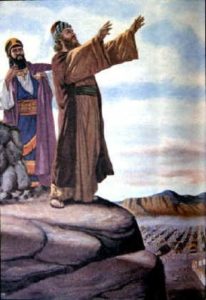
King Balak made an impressive bid for Balaam’s divination services. He sent two delegations of celebrity officials with money in hand. However, the God of Israel appeared to Balaam and told him not to go with these men, and not to curse the Israelites because they are blessed. The next day Balaam reports to Balak’s delegation that they must go back to their land because the LORD God of Israel (Yahweh) has refused to let him go.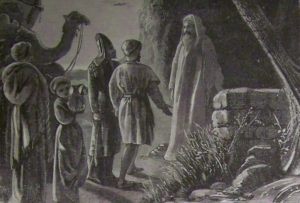
Weeks, if not months, later, Balak sends a second delegation to Balaam who offer him a position of honor and whatever price he asks for, if he would curse the people of Israel. Although God had already revealed His will and forbidden Balaam to go, Balaam entertains the delegation and makes a second inquiry to the Lord. God chooses to work with Balaam who is violating His “will of command” and allows him to go with them, but then gives a prophecy to Balaam saying: “Only the word which I speak to you shall you do.” (Numbers 22:20).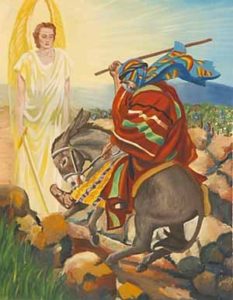
The Lord repeats this word to Balaam as he is riding his donkey with the Moabite men. He manifests Himself first to the donkey who has the sense to both fear Him and bow before Him. However, Balaam beats his faithful donkey for responding to God whom Balaam does not see. Then the Lord puts words in the mouth of the donkey, “What have I done to you that you have struck me three times?” These words reflect the fact that not only had Balaam been beating his donkey but he had been rebelling against the Lord, the Faithful God of Israel. And why was Balaam being disobedient to the Lord? Balaam answered the question put in the donkey’s mouth, “Because you have made a mockery of me.” Balaam was angry because he wanted to look good in the eyes of the Moabite celebrities and to maintain his honor among them. The donkey’s behavior was making Balaam look foolish.
Then the Lord opened Balaam’s eyes and he saw the angel of the Lord with his sword drawn in his hand prompting Balaam to bow all the way to the ground. Balaam needed to see that the Lord was his adversary in this matter. It would be best for him to agree with his adversary quickly and repent (See Matthew 5:25)!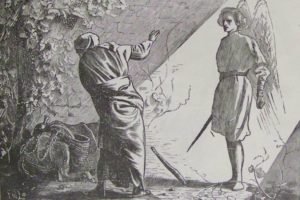
The angel of the LORD indicates that He is the same God who told Balaam that he was to “speak only the word which I tell you” (Numbers 22:20, 35). This is another case of a theophany– God appearing as “the angel of the LORD” in the Old Testament.
King Balak enthusiastically receives Balaam at the city of Moab and takes him up to the high places of Baal.
We see Balaam’s dishonesty in the way he habitually rephrases the truth to make it acceptable to all. He cloaks the truth that Israel has already been blessed and that he cannot curse them, by saying, “Am I able to speak anything at all? The word that God puts in my mouth, that I shall speak.”
Balaam is not the only prophet who was given things to say that he really did not want to say. But the humble submission that was evident in his donkey was not evident in Balaam, even after he admitted that he had sinned.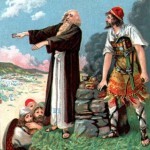
First Balaam started by putting on a religious show. He created what he considered to be the right atmosphere for a manifestation of God’s power. He commands Balak and his audience to build seven altars and prepare seven bulls and rams. There is no indication that God had asked for this. It was an act of religious manipulation. The number seven, signifying completeness, was held in high regard by all the Semitic people in general and was popular in all religions.
God meets with Balaam and tells him to return to Balak and speak the words that He will give. Balaam’s first prophecy was that Israel was a special people called to be set apart.
What a difference between God’s words and Balaam’s words! He starts straight off with the truth,” How shall I curse whom God has not cursed?”
Balak is furious as Balaam blesses Israel from the top of the rocks of the high place of Baal. He suggests that Balaam prophesy from another vantage point and takes him to the field of Zophim from the top of Pisgah, the high peak of Moab overlooking the Promised Land of Canaan.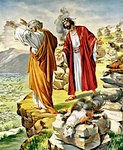
The second prophecy was that God had put an irrevocable blessing upon Israel (22:20). “God is not a man that He should lie, nor a son of man, that He should repent; Has He said, and will not He do it? He was in their midst as their God, to be their victory. He is their only King and His shout is among them! (22:21).
Numbers 24 gives us a hint that it wasn’t until after these first two prophecies were given that Balaam concluded that it pleased the LORD to bless Israel! He did not need “to go as at other times to seek omens”, nor did he need to build altars for burnt offerings to woo the gods! (Numbers 24:1)
Abandoning his customs of divination, he now simply set his face toward the wilderness. As he lifted up his eyes and saw Israel camping tribe by tribe, the Spirit of God came upon him and he prophesies seeing once again Israel as she is seen of God saying “How fair are your tents, O Jacob, Your dwellings, O Israel!” (Numbers 24:5)
“He will devour the nations who are his adversaries, and will crush their bones in pieces… Blessed is everyone who blesses you, and cursed is everyone who curses you.” (Numbers 24:8-9)
These are not the words that King Balak paid good money to hear. He threatens to withdraw his offer of a position of honor because the LORD has forbidden the cursing of Israel (Numbers 24:10-11).
The final prophecy is the one in which Balaam sees the future- the Messiah. It has its initial fulfillment in the rise of the Davidic dynasty (24:17,19) but ultimately speaks of the Messiah. It is likely that the Magi who came from the East to honor Jesus as the Messiah recognized the star of Bethlehem as the star of Numbers 24:17 (cf. Matthew 2:2):
“I see him, but not now; I behold him, but not near; A star shall come forth from Jacob, A scepter shall rise from Israel, And shall crush through the forehead of Moab, And tear down all the sons of Sheth. (Numbers 24:17; NASB) 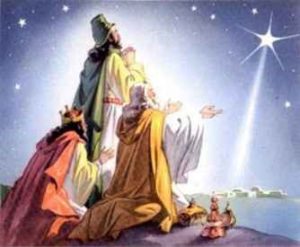
19 “One from Jacob shall have dominion, And will destroy the remnant from the city.”
Numbers 24:19 (NASB)
The LORD would not allow Balaam to curse Israel. The supernatural gift that had brought him international reputation failed to deliver the results that the Moabites wanted. His sorcery and omens were also powerless against Israel. What was worse is that Balaam had pronounced blessing, holiness, beauty and victory upon Israel.
In the New Testament, Balaam is held up as an example of a false prophet even though what he said in these prophecies were true. Though God gave him prophecies, the character of his ministry was false throughout. And, as we see in the remainder of his story, he led Israel astray.
A true prophet in the Bible is not just one who speaks words that are true and whose predictions come to pass. Jesus said:
15 “Beware of the false prophets, who come to you in sheep’s clothing, but inwardly are ravenous wolves. 16 “You will know them by their fruits. Grapes are not gathered from thorn bushes nor figs from thistles, are they?” Matthew 7:15-16 (NASB) 
The words that Balaam spoke in Balak’s presence did not come from his gift of divination. Divination was the pagan counterpart of prophecy, and is forbidden in Scripture (Leviticus 19:6, 20:27; Deuteronomy 18:9-14). In Ezekiel 13:6-9 those who practice divination are called false prophets.
6 “They see falsehood and lying divination who are saying, ‘The LORD declares,’ when the LORD has not sent them; yet they hope for the fulfillment of their word. 7 “Did you not see a false vision and speak a lying divination when you said, ‘The LORD declares,’ but it is not I who have spoken?”‘
” 8 Therefore, thus says the Lord GOD, “Because you have spoken falsehood and seen a lie, therefore behold, I am against you,” declares the Lord GOD.
9“So My hand will be against the prophets who see false visions and utter lying divinations. They will have no place in the council of My people, nor will they be written down in the register of the house of Israel, nor will they enter the land of Israel, that you may know that I am the Lord GOD.” Ezekiel 13:6-9 (NASB)
Balaam did not want to lose his position of honor by utterly disappointing King Balak so he made one further suggestion before he left. He suggested that Balak send ritual prostitutes into the camp of Israel and have them invite the men to join him at the Feast of Baal of Peor. If they could be corrupted with immorality and idolatry their God will destroy them.
The event occurs in Numbers 25:1-3 but we have the explanation in Numbers 31:16:
16 “Behold, these caused the sons of Israel, through the counsel of Balaam, to trespass against the LORD in the matter of Peor, so the plague was among the congregation of the LORD. Numbers 31:16 (NASB)
Balaam knew what motivates and seduces people. The food and the women of Moab would be attractive bait for the young men tired of life in the wilderness.
As the Israelite men were lured by the seductive invitation of the women to attend their feasts, they would have to bow down to the Baal of Peor.
3 So Israel joined themselves to Baal of Peor, and the LORD was angry against Israel. Numbers 25:3 (NASB)
In judgment for their sin a plague came upon the entire camp at Shittim. The whole nation would have been destroyed if it were not for the sin being removed chiefly through the work of one man’s atoning work (again a prophetic reference to the gospel).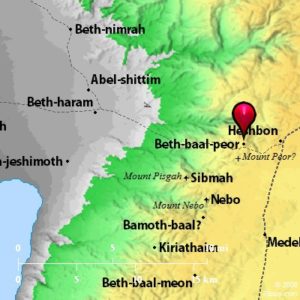
Do you not know that a little leaven leavens the whole lump of dough? 7 Clean out the old leaven so that you may be a new lump (1 Corinthians 5:6-7).
The ploy of bringing judgment upon Israel through the sin of idolatry and spiritual and physical fornication was so successful that one young man brazenly brought a Midianite woman into his family tent to have sexual relations with her.
Phineas, the grandson of Aaron, and the son of Aaron’s successor, Eleazar, immediately rose up to root out this blatant violation of the covenant that had been made with God. He destroyed the destructive work of the enemy by putting the sinner and the seducer to death by the spear.
The Lord says of Phineas’ vindication of God’s covenant,
11 “Phinehas the son of Eleazar, the son of Aaron the priest, has turned away My wrath from the sons of Israel in that he was jealous with My jealousy among them, so that I did not destroy the sons of Israel in My jealousy. 12 “Therefore say, ‘Behold, I give him My covenant of peace; 13 and it shall be for him and his descendants after him, a covenant of a perpetual priesthood, because he was jealous for his God and made atonement for the sons of Israel.'” Numbers 25:11-13 (NASB) 
The Lord pronounced a judgment on sin- death (Romans 6:23). 24,000 died in the plague as a result of Balaam’s seduction. It took a bold believer-priest to make atonement, stop the plague and save his people.
The names of the transgressors are exposed as a warning to those who would think that what is done in privacy is merely their own business. “Do you not know that a little leaven leavens the whole lump? Therefore, get rid of the leaven (sin)” (1 Cor 5:6) The sin of this couple, Zimri and Cozbi, due to the false teaching of Balaam, brought judgment upon Israel. But sin received its due punishment through the work of Phineas, which stayed the hand of death.
The apostle John is told to give this message to the church at Pergamum which was walking in the way of spiritual and moral compromise:
14‘But I have a few things against you, because you have there some who hold the teaching of Balaam, who kept teaching Balak to put a stumbling block before the sons of Israel, to eat things sacrificed to idols and to commit acts of immorality. Revelation 2:14 (NASB)
What about us? Do we allow ourselves to be corrupted by the counterfeit gods of our culture? Do we find ourselves bowing to them as we partake of their entertaining feasts? Have we bought into false teaching that we should be friends of the world and thereby become enemies of God (James 4:4)?
Are we fascinated by the ritual prostitutes of contemporary society who would seduce us away from our covenant relationship with a holy God?
NEW TESTAMENT READING: LUKE 2:1-35
Luke is regarded as a first-rate historian by contemporary scholars. He anchors events in history with references to the events taking place in the world at that time. He refers to the census taken when Quirinius was governor of Syria.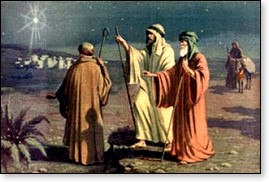
How wonderfully we see the hand of God orchestrating events through a Roman edict that would shift populations and cause Jesus of Nazareth to be born in Bethlehem, and thereby fulfill the Messianic prophecy:
2 “But as for you, Bethlehem Ephrathah, Too little to be among the clans of Judah, From you One will go forth for Me to be ruler in Israel. His goings forth are from long ago, From the days of eternity.” Micah 5:2 (NASB)
It is significant that the birth of the Lamb of God ,who would take away the sins of the world, was born in Bethlehem where so many of the sheep were raised who would one day be sacrificed at the temple in nearby Jerusalem. And how fitting that the angels’ birth announcement went, not to the nobles or religious leaders of Israel, but to the shepherds who were keeping a watch over their flocks at night!
TODAY’S READING FROM PSALMS: Psalm 59:1-17;
It is obvious that David, when writing this psalm, is in a difficult place. Saul, who was once his hero, a father-figure at whose table he once dined as an adopted family member, was now an enemy constantly plotting evil against him. Saul sent his spies to watch David’s house to seek an opportune moment to kill him.
Our enemies may watch for ways to cause us harm. But, like David, we can call out to God and watch for Him (v.9). David rests in the fact that the Lord is his stronghold.
The enemy of our soul never lets up. In the light of this David does not give in to discouragement. He speaks to his soul words of encouragement:
Psalm 59:16-17 (NASB) 16 But as for me, I shall sing of Your strength; Yes, I shall joyfully sing of Your lovingkindness in the morning, For You have been my stronghold and a refuge in the day of my distress. 17 O my strength, I will sing praises to You; For God is my stronghold, the God who shows me lovingkindness.
THE PROVERB FOR THE DAY
Proverbs 11:14 (NASB) 14 Where there is no guidance the people fall, but in abundance of counselors there is victory.
I particularly see this Proverb as one that calls me to seek counsel from the Scriptures. Not just one Scripture, but Scripture as a whole, an abundance of counselors are found therein! I am also grateful for mature and experienced brothers and sisters who offer their counsel. But I must always test their counsel with Scripture.
PRAY FOR THE NATIONS
Today we continue to pray for Brazil. The following is from the Prayer Guide: “Operation World” (p. 164-165).
The emergence of evangelicals in Brazil has been dramatic. Yet despite the growth from 2.9% in 1960 to 26.3% in 2010- there are many prayer needs.
Numerical rather than spiritual growth is the emphasis of too many groups to the point of dishonest inflation of numbers and disregard for discipleship. As a result, churches have multiplied, but congregations are filled with immature, unfed spiritual infants whose faith is overly based on emotionalism, petty legalism and the personality of leaders. Such zeal without maturity leads to spiritual error, nominalism, widespread church hopping without commitment to a particular church and large-scale backsliding.
Prosperity theology has shaped much of Pentecostalism in Brazil, with those on top of the pyramid enjoying celebrity status and lifestyles- as well as financial scandals- while millions of poor hold out for a miracle of healing or financial blessing. Pray for a right balance between expectation of blessing and daily sanctification.
Leadership models are sorely lacking, as witnessed by the scandals and moral failures of some high-profile leaders characterized more by their wealth, power and lack of accountability than their humility and faithfulness.
Effective appropriate training is a key to addressing the above issues. Rapid growth, especially among Pentecostals, has generated a dearth of trained leaders. With over 200,000 evangelical congregations, traditional education models are inadequate to meet the need.
Catholics in Brazil number more than in any other country, but the Church itself remains in crisis. The defection rate has slowed, but it continues to lose members to evangelicals, to Spiritists and to non-religion. By 2025, Catholicism could be a minority religion, having held 95% of the population around 1950. Around 70% of ex-Catholics are now evangelicals. Even within Catholicism, only a small minority remain traditionally Catholic and faithful in practice; many others are influenced by Spiritism, nominalism or the charismatic renewal.
Pray for Unity. Evangelical denominations have mushroomed in the last 20 years as new groups form with almost every theological disagreement or interpersonal conflict. There could be over 4,000 distinct evangelical groups. The success mentality based on numbers and income can induce rivalry and jealousy. Pray for the Evangelical association of Brazil to be a means of fostering lasting unity, fellowship and prayerful cooperation.
PRAYER: Father, thank You for Your pure Word, the incorruptible seed, the gospel proclaimed that by the power of Your Spirit has birthed in us our new life. Help us to appreciate the fact that we are blessed with every spiritual blessing in Christ Jesus. Keep us from the false teaching of Balaam that would encourage spiritual and moral compromise. Help us to flee idolatry and worship You alone. In Jesus’ Name. Amen.
Pastor David
